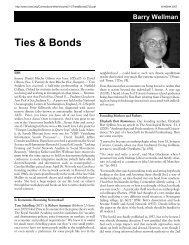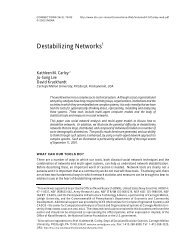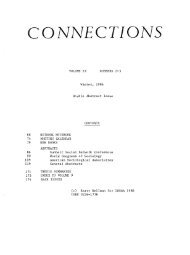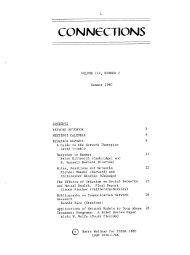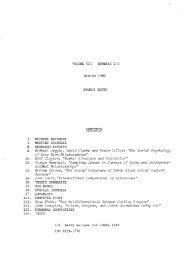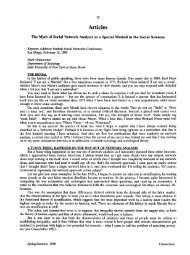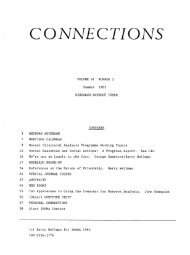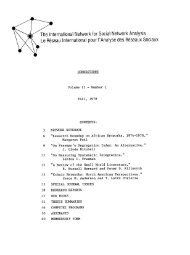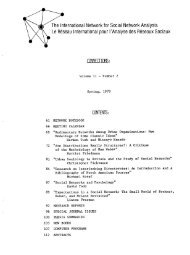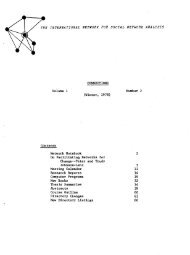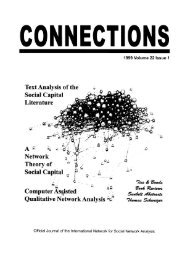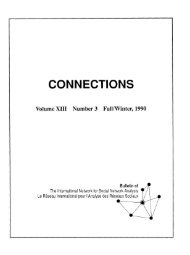Sunbelt XXXI International Network for Social Network ... - INSNA
Sunbelt XXXI International Network for Social Network ... - INSNA
Sunbelt XXXI International Network for Social Network ... - INSNA
You also want an ePaper? Increase the reach of your titles
YUMPU automatically turns print PDFs into web optimized ePapers that Google loves.
Exploring Knowledge Transfer In Virtual Communities Of Practice: An Empirical Test In Medical SettingsZappa, Paola<strong>Network</strong> Dynamics<strong>Network</strong>s And Health, On‐line Communities, Scientific <strong>Network</strong>s, Knowledge Transfer, Actor‐based Models, Strong TiesWED.PM2What explains the survival of virtual communities of practice over time? In order to address this question, this paper focuses on the ability of virtualcommunities to promote knowledge transfer processes among members. There<strong>for</strong>e, it tests two rival hypotheses: virtual communities are shaped by atendency toward interaction among similarly knowledgeable peers vs. cooperation among different actors, according to a division of labor based on expertise.This paper aims at making three contributions on the topic. It controls <strong>for</strong> the effect of various sources of heterogeneity among actors on the propensity totake action. It explores the role played by the diversity and strength of ties in the knowledge transfer process. Finally, it verifies the hypotheses on an empiricalsetting in which virtual communities are still at an experimental stage of development. Data are collected from the Italian rare cancer network (RCN), a stablecooperation among 130 oncologists on resolving complex diagnoses and testing experimental treatments. We consider all advice seeking actions undertakenby the users since January 2004. We moreover collect field data on the clinical per<strong>for</strong>mance of each physician, which we assume as a measure of effectiveknowledge transfer. Using stochastic actor‐based models we then examine the co‐evolution of network structure and actor per<strong>for</strong>mance.Exploring The Potential Benefits To <strong>Social</strong> <strong>Network</strong> Research By Integrating Qualitative Activity Systems AnalysisYamagata‐Lynch, Lisa C.; Cowan, JohnQualitative and Mixed Method <strong>Network</strong> studiesQualitative Approaches, Distributed Teams, AdultsSAT.AM1This session will explore the potential benefits to social network research from the coordinated use of activity systems analysis and social network analysis <strong>for</strong>understanding complex human interactions. Our goal in this session is to introduce the methodological compatibility between activity systems and socialnetwork analyses then explore the benefits <strong>for</strong> using them in mixed methods research. These two methods are an optimal match in research because activitysystems analysis can help explain why and how individuals engage in individual or collective activity within their community and how they influence theenvironment (Engeström, 1987, 1993), while social network analysis captures the structure of the connections between individuals in an activity and therelationship of this structure to the activity (Hanneman and Riddle, 2005). Taking a mixed methods approach with these analyses techniques can provide socialnetwork researchers with unique perspectives at the individual, group, and social levels regarding how activities and social interactions influence one anotherand the environment. We will center this discussion surrounding a data set from a National Science Foundation Opportunity <strong>for</strong> Enhancing Diversity inGeoscience grant (award number 0703541).



